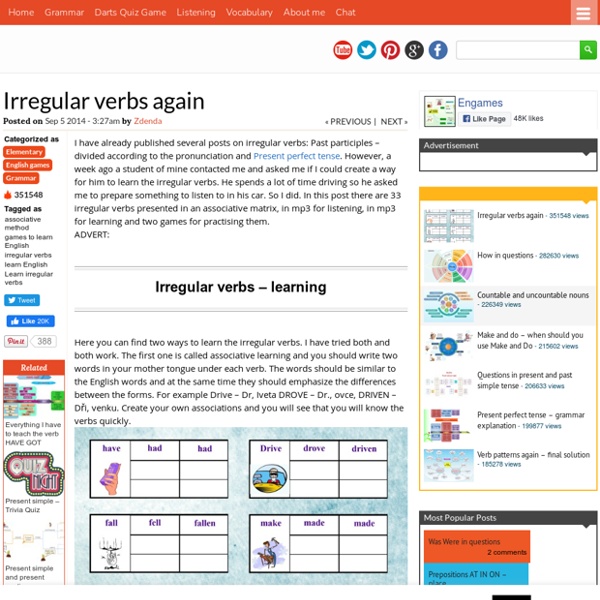Fun 1st Conditional Practice
Stimulating ways of practising “If + Present Simple, Will” sentences in the classroom. There are so many fun things that you can do with the first conditional that there is a danger of spending far too much time on it, so please read through the list below and select a couple rather than working your way through them! 1. Negotiations The first conditional is often used in sentences like “If I give you a lift to the station, will you lend me your car for the rest of the day?”
More / -er than
fun. This modernish noun (first recorded in 1700 and stigmatized by Johnson as 'a low cant word') has become an informal quasi-adj., esp. in the second half of the 20C. We had a fun time, exclaims many a young person after a party, an outing, a holiday, etc., or It was a fun thing to do, meaning 'an amusing or enjoyable thing'. But it has not yet gained admission to the standard class of adjectives in that, in serious writing, it (so far) lacks a comparative and a superlative. In ordinary attributive use fun is quite frequent, esp. in funfair, the American word funfest (a gathering for the purpose of amusement), and fun run (an invention of the 1970s).
Irregular Verbs — Exercise 3
Directions: In the exercise that follows, you will read sentences that contain blanks. These blanks require the appropriate forms of irregular verbs. To keep track of your answers, print the accompanying handout.
Learn Irregular Verbs with Engames and Fluency MC
I have already published 10 posts on teaching irregular verbs. You can see the list of the posts down here: But I still cannot say that my students know the verbs. That was why I joined forces with Fluency MC, and this time we would like to teach the irregular verbs together. To achieve this, we have prepared a song, an infographic, a game and an online quiz.
Irregular Verbs — Exercise 2
Directions: In the exercise that follows, you will read sentences that contain blanks. These blanks require the appropriate forms of irregular verbs. To keep track of your answers, print the accompanying handout. If you are unsure which choice to make, consult the rules. Otherwise, face the consequences!
36 fun classroom activities for Present Simple and Continuous
By: Alex Case |Audience: Teachers|Category: Teaching English I have recently published 56 communicative activities to teach Present Simple and 35 for practising Present Continuous, often combined with things like frequency expressions and pronunciation to make lessons on these rather basic tenses more useful. However, the most useful thing you can do with Present Simple and Present Continuous is teach and practise them together, contrasting their meanings and uses.
English stuff ESL: YOUR FAVOURITE SANDWICH (activities for elementary & intermediate students)
Shall we prepare a delicious sandwich for school tomorrow? Do you have one in mind? What ingredients would you use? Enter this site to check one out!
Irregular Verbs — Exercise 1
Directions: In the exercise that follows, you will read sentences that contain blanks. These blanks require the appropriate forms of irregular verbs. To keep track of your answers, print the accompanying handout.
English Prepositions
So what are prepositions? A preposition is a word which is used before a noun to show its connection to another word in the sentence. For example:
7 grammar myths you learned in school
Grammar can be tough. There are a lot of rules to follow, and a lot to wrap your head around. Some of the rules we learn in school, though, aren’t exactly accurate.
English Teacher Party: A Look into the Real Life of an English Teacher
Recently my class read Sixth Grade Can Really Kill You by Barthe DeClements and they loved it! The book is about a girl named Helen, “Bad Helen”. She gets her name because she’s always playing pranks on her teacher. Helen has dyslexia and is struggling in school. She may even fail until she meets Mr. Marshall.
Irregular Verbs
First the good news - all new verbs in English are regular. I photocopied the report. She faxed it to me. They emailed everybody about it. However, that doesn't help you to learn the approximately 180 irregular verbs which do exist.
Learn English Parts of Speech - Explanations, Examples and Exercises
There are eight different English parts of speech, but before we continue any further... Click Here for Step-by-Step Rules, Stories and Exercises to Practice All English Tenses What is a Part of Speech?



